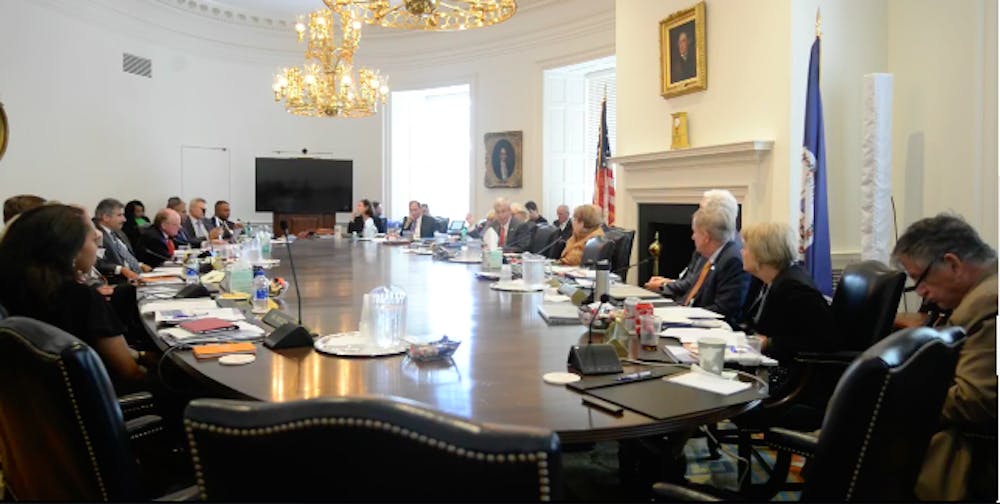In December, the Board of Visitors voted once again to raise tuition and fees across the University. With this latest increase, the estimated annual cost of attendance for undergraduates in the college now sits at a whopping $32,000 for in-state and $63,000 for out-of-state students, a hefty price that adds up to a small fortune over the course of four years. Meanwhile, counterintuitively, the University sits on an endowment worth $8.6 billion and counting. Despite this extraordinary wealth, the University fails to fulfill some of its most basic responsibilities as a public institution.
While the affluence of the University is in a broad sense historically unprecedented, it is certainly not alone in the contemporary landscape of higher education. Even with an $8.6 billion endowment, it still doesn’t even crack the top ten, a list populated by some of the most esteemed schools in the country. This is no coincidence. Today, “elite university” is synonymous with “wealthy university” — the two statuses symbiotically feed off each other, ballooning by the year. It is also hardly a coincidence that of the top ten schools by endowment, eight are private institutions and most fall in the coveted “Ivy Plus” category. This astronomical wealth is a direct product of an administrative strategy that has been refined over the years by elite private schools. Even the two public schools that make the top ten are “Public Ivies,” a grouping that includes the University.
Although the title of “Public Ivy” is absurd on its face, it is deeply telling of the culture in higher education. The label “Public Ivy” reeks of a desperation for prestige that is increasingly characteristic of schools like the University. Traditional Ivy League schools have known for centuries that wealth confers status and status confers wealth, and now that public schools like the University have caught on, they seem committed to emulating this model. From a self-serving perspective, this might appear to be a positive development — one could reasonably expect students to celebrate the University’s pursuit of prestige. It’s true, the University’s growing prominence only serves to better the opportunities available to students — and yet it’s hard to not find this obsession with cultural eminence fundamentally troubling. The University is first and foremost a public institution, and its pursuit of elite status detracts from its primary responsibility — to serve the Commonwealth.
The University is acutely lacking in accessibility for those that might otherwise benefit most from the opportunities it has to offer. In the Commonwealth of Virginia, 1 in 10 residents live below the federal poverty line. That statistic, while striking, nevertheless fails to truly capture the economic hardships that are a fixture in so many more lives. At the University on the other hand, almost the same proportion of undergraduate students come from the top 1 percent of wealth. Further, two-thirds of students come from the top 20 percent, while less than 3 percent come from the bottom 20. In an ideal world, public schools like the University would be powerhouses of economic mobility, granting underprivileged students a state-subsidized ticket to the middle class. Despite all of the resources at its disposal, the University falls despairingly short of this ideal.
The nexus between these two facts — the University’s quest to preserve an elite status and the systemic underrepresentation of underprivileged Virginians — is simple economics. Financing a project of elitism is expensive, and so is financing a project of accessibility. Critically, the University has decided to prioritize the former. Although the University administration boasts of numerous programs designed to increase accessibility, the numbers are plainly revealing — they are simply not doing enough. Whether it’s a problem of outreach, financials or community development, it is clear that the University could be doing much more to make meaningful inroads into low-income communities. Even clearer still is the fundamental truth that money is not what holds us back. So long as the University continues to sit on an $8.6 billion endowment, and enroll 22 times as many students from the top 20 percent of income as it does from the bottom 20 percent, any argument touting its accessibility will remain wholly unconvincing.
In a deeper sense, the University is spurning an opportunity to actively shape the culture of American higher education. Imagine for a moment if the University purposefully ignored the rat race of rankings and endowment building, if one of the richest institutions in the history of the world made meaningful investments to truly open itself up to the public in a way that exclusivity obsessed private schools would never dream of doing. The University has the power to reshape the role of higher education in countless lives. Instead, the University will likely continue investing in prestige and making token attempts to increase accessibility, so long as the community remains complacent. To that point, when University leadership claims to be pursuing excellence, it begs the question of who exactly that excellence is meant to benefit. Again, it is the student body who most directly reap the rewards, and it is admittedly difficult to simply forego this advantage. It’s unsurprising that the University continues to abdicate its responsibilities when the community directly benefits from its machinations — and yet this does not broadly excuse its shortcomings. Moving forward, the University community must seriously consider what it actually means to be a public institution, and what it means to serve the public.
Brendan Novak is an Opinion Editor for The Cavalier Daily. He can be reached at b.novak@cavalierdaily.com.







